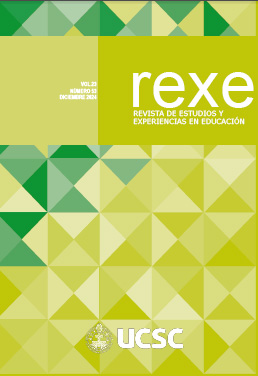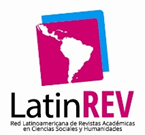Socio-educational experiences of Medical Technology university students regarding admission to post-covid face-to-face
DOI:
https://doi.org/10.21703/rexe.v23i53.2627Keywords:
Socio-educational experiences, COVID-19, University students, higher educationAbstract
The article gives an account of research results on the socio-educational experiences of university students in a Medical Technology career, regarding virtual classes and admission to post-covid face-to-face at a university in La Araucanía, Chile. The research problem is related to the return to post-covid face-to-face attendance, which has brought with it possibilities and limitations for university students, a product of the new modality of face-to-face attendance and incorporation into university life, after having spent two years through the virtuality. The methodology is of a qualitative nature, from a descriptive approach, the instrument for collecting information was the semi-structured interview. The main results show that virtuality brought with it problems associated with the practice of the professional work of the medical technologist, which had a negative impact on the acquisition of skills and abilities for practical work in laboratories. Likewise, it is revealed that the return to face-to-face brought with it problems such as ignorance of the pedagogical strategies and practices used by teachers to address the different disciplinary contents in their professional training. In addition, socio-educational experiences that have affected mental health and socialization are revealed, such as the change of location and changes in teaching methods. Regarding the possibilities of returning to face-to-face, students recognize that it has allowed them to socialize and interact with their peers, facilitating the academic process and their insertion into university life.
Downloads
References
Aguilar, F. (2020). Del aprendizaje en escenarios presenciales al aprendizaje virtual en tiempos de pandemia. Estudios pedagógicos (Valdivia), 46(3), 213–223. http://dx.doi.org/10.4067/S0718-07052020000300213
Alarcón, R. (2019). La Salud Mental de los estudiantes universitarios. Revista Médica Herediana, 30(4), 219-221. https://doi.org/10.20453/rmh.v30i4.3655
Arancibia, V. (2008). Manual de psicología educacional. Ediciones UC.
Aretio, L. G. (2021). COVID-19 y educación a distancia digital: preconfinamiento, confinamiento y posconfinamiento. RIED-Revista Iberoamericana de Educación a Distancia, 24(1), 9-32. https://doi.org/10.5944/ried.24.1.28080
Arteaga-Hernández, K. M., Chávez-Lucas, A. C., & Castro-Jalca, J. E. (2024). Impacto de la enseñanza aprendizaje y rendimiento académico en tiempos de covid y post covid-19 en niños y adolescentes. MQRInvestigar, 8(1), 4712-4728. https://doi.org/10.56048/MQR20225.8.1.2024.4712-4728
Cauas, D. (2015). Definición de las variables, enfoque y tipo de investigación. Bogotá: biblioteca electrónica de la universidad Nacional de Colombia, 2, 1-11.
Chirinos, N. M., Castro, H., y González, R. (2021). La educación virtual como apoyo instruccional durante el proceso de aprendizaje en la educación superior de Venezuela. Congreso Iberoamericano de Educación Metas, 1-13.
Cueva, M. A. L., y Terrones, S. A. C. (2020). Repercusiones de las clases virtuales en los estudiantes universitarios en el contexto de la cuarentena por COVID-19: El caso de la PUCP. Propósitos y representaciones, 8(SPE3), 588. https://doi.org/10.20511/pyr2020.v8nSPE3.588
Dison, L., Padayachee, K., de Klerk, D., Conradie, W., MacAlister, F., Moch, S., y Krull, G. (2022). Reframing purpose and conceptions of success for a post-Covid-19 South African higher education. Scholarship of Teaching and Learning in the South, 6(1), 33-54. https://doi.org/10.36615/sotls.v6i1.222
Flores-González, N. (2022). El perfil del docente y su adaptabilidad a entornos educativos virtuales. RECIE. Revista Caribeña de Investigación Educativa, 6(2), 99-115. https://doi.org/10.32541/recie.2022.v6i2.pp99-115
García, K. A., & Lescay, D. M. (2023). Actividades pedagógicas en el uso de las plataformas virtuales para el refuerzo académico en Educación Básica. Revista Científica Sinapsis, 23(1), 1-21. https://doi.org/10.37117/s.v23i1.764
Hernández, R., Collado Fernández, C., y Baptista Lucio, P. (2010). Metodología de la Investigación. México, D.F.: McGrawHill.
Hidalgo, G. A., Remache, J. B., & Calle, W. A. C. (2021). Análisis Pestel en el impacto del Covid-19 en la educación superior. Revista Conrado, 17(S1), 440-448.
Hu, K., Patel, J., Swiston, C., y Patel, B. C. (2022). Ophthalmic manifestations of coronavirus (COVID-19). StatPearls. StatPearls Publishing.
Kakepotoa, I., Memonb, I. A., Halepotoc, I. A., Talpurd, Q., yJalbanie, K. B. (2021). Exploring E-Learning Barriers of University Students during COVID 19 Pandemic. International Journal of Innovation, Creativity and Change, 15(6), 1161-1174.
Lin, L., Shek, D. T., y Li, X. (2022). Who benefits and appreciates more? An evaluation of Online Service-Learning Projects in Mainland China during the COVID-19 pandemic. Applied research in quality of life, 1-22.
Lopezosa, C. (2020). Entrevistas semiestructuradas con NVivo: pasos para un análisis cualitativo eficaz. Lopezosa C, Díaz-Noci J, Codina L, editores Methodos Anuario de Métodos de Investigación en Comunicación Social, 1. Barcelona: Universitat Pompeu Fabra; 2020, 88-97.
Ministerio de Educación de Chile. (2023). Plan de Reactivación Educativa. Ministerio de Educación de Chile.
Morocho-García, M. F. (2021). Las competencias comunicativas de los docentes para la atención a la diversidad (Master's thesis, Guayaquil: ULVR, 2021).
Miranda, V., Margoth, A., Burbano Pantoja, V. M., y Burbano Valdivieso, Á. S. (2020). Percepción de estudiantes universitarios colombianos sobre el efecto del confinamiento por el coronavirus, y su rendimiento académico. Revista espacios, 41, 269-281.
Oyarzún, F. R. L., Venegas, L. A. M., González, M. B. R., Thiers, M. A. H., y Henríquez, F. I. V. (2022). Continuidad del proceso formativo en Pandemia. Experiencia estudiantil en la Universidad de Los Lagos, Chile. Actualidades Investigativas en Educación, 22(2), 1-30. https://doi.org/10.15517/aie.v22i2.48716
Patrono, A., Renzetti, S., Manco, A., Brunelli, P., Moncada, S. M., Macgowan, M. J., y Lucchini, R. G. (2022). COVID-19 Aftermath: Exploring the Mental Health Emergency among Students at a Northern Italian University. International journal of environmental research and public health, 19(14), 8587. doi: 10.3390/ijerph19148587
Ramírez-Montoya, M. S. (2020). Transformación digital e innovación educativa en Latinoamérica en el marco del COVID-19. Campus virtuales, 9(2), 123-139.
Rincón, A. C. (2022). Efectos de la educación de la emergencia sanitaria por COVID 19: deserción escolar, afectación del logro educativo y de la salud de los estudiantes. Ciencia Latina Revista Científica Multidisciplinar, 6(4), 3598-3619.
Sevy-Biloon, J. (2021). Virtual or Face to Face Classes: Ecuadorian University Students' Perceptions during the Pandemic. English Language Teaching Educational Journal, 4(1), 15-24.
Tumpay, M. H., Beizaga, D. A. S., & Candía, S. S. D. (2022). Retorno o no a las clases presenciales universitarias Cusco-2022. Revista Científica Integración, 5(1), 53-60.
Velázquez, L. G. (2020). Estrés académico en estudiantes universitarios asociado a la pandemia por COVID-19. Espacio I+ D, Innovación más desarrollo, 9(25), 158-179.
World Health Organization. (2020). Operational considerations for COVID-19 management in the accommodation sector. World Health Organization.
Downloads
Published
How to Cite
Issue
Section
License
Política de acceso abierto
Esta revista proporciona un acceso abierto inmediato a su contenido, basado en el principio de que ofrecer al público un acceso libre a las investigaciones ayuda a un mayor intercambio global de conocimiento.
Licencia
Revista REXE "Revista de Estudios y Experiencias en Educación" de la Facultad de Educación, Universidad Católica de la Santísima Concepción, está distribuido bajo una Licencia Creative Commons Atribución 4.0 Internacional.






